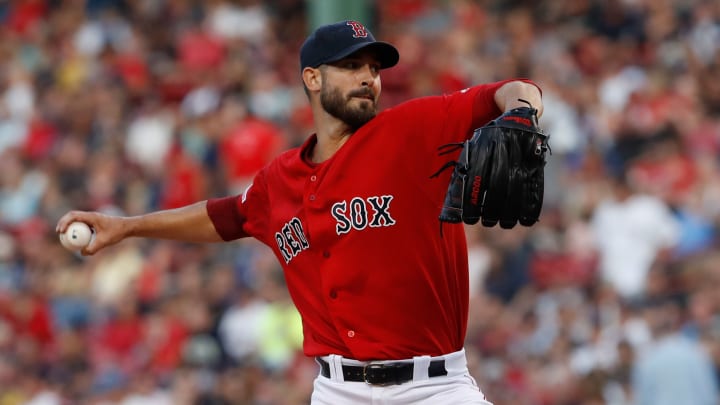Winter Meetings Notebook: Rick Porcello Signing Great Deal for Mets

The Mets made one of the best value free-agent signings by getting Rick Porcello on a one-year deal for less money ($10 million) than what the Angels gave a broken Matt Harvey last year ($11 million). Porcello is one of the game’s most durable starters and will benefit as just about all 30-something pitchers do by transitioning from the AL to the NL–and he knows it.
Porcello to the Mets is one of those signings in which the fit is more important than maxing out terms. He turned down $12 million from the Toronto Blue Jays with the possibility of securing a second year from them, a $14 million offer and multiple multi-year offers, including one for three years. Porcello, who turns 31 this month, was impressed with the presentation of the New York Mets on the flow of their pitching information. Making 16 starts at Citi Field rather than Fenway Park should help, as well.
The righthander has terrific tools in terms of spin rate but needs to refine how he uses his stuff. Look for new Mets pitching coach Jeremy Hefner, who came from Minnesota, to turn Porcello into Jake Odorizzi 2.0–working the zone up and down rather than side to side. A guy with similar stuff, Odorizzi had a lengthy conversation with Porcello last September about how that transition helped his career.
Porcello’s other issue is that he can’t rely as often on his fastballs, especially his sinker, to put hitters away. His biggest problem in 2019 was making mistakes with his fastball when ahead.
Check this out. Porcello was among the best pitchers in baseball when it comes to getting the count in his favor:
Most Pitches Thrown Ahead of Count (Min. 2,500 pitches)
1. Max Scherzer, Nationals | 35.9% |
|---|---|
2. Justin Verlander, Astros | 34.5% |
3. Rick Porcello, Red Sox | 33.8% |
4. Gerrit Cole, Astros | 33.6% |
But then he becomes one of the worst pitchers in baseball:
Highest BA Allowed Ahead of Count (Min. 2,500 pitches)
1. Ivan Nova, White Sox | .263 |
|---|---|
2. Rick Porcello, Red Sox | .254 |
3. Brett Anderson, A's | .252 |
4. Steven Matz, Mets | .251 |
5. Merrill Kelly, Diamondbacks | .249 |
Major league hitters batted .200 when the pitcher controlled the count this season. But batters hit .285 against Porcello’s fastballs when he was ahead of the count, up from .173 in 2018. The Mets should be encouraged that fixing Porcello, a guy with excellent spin on his four-seam fastball and curveball, is not a matter of hoping a pitcher gets healthy or rediscovers velocity but how he uses his stuff.
***
Major League Baseball made an epic fail with this three-batter minimum requirement. The biggest pace of game issue is the time between pitches, which keeps climbing. Player dawdling has added 10 minutes of nothingness to a game in just the past four years, stretching the average time between pitches from 22.7 to 24.9 seconds.
MLB has had the right to implement a pitch clock, which would affect every game, but instead it is implementing a rule that applies only about once every three or four games–but when it does it tends to be in high-leverage spots. One or two batter appearances are at an 11-year low. Average time per game saved: 44 seconds. Ridiculous.
Who might this rule affect the most? Certainly not the Astros, who had only 37 relief appearances all year of one or two batters. (Only about one-third of such short outings would be affected.)
The managers who would most be affected? The Angels’ Joe Maddon (121 with the Cubs last year), the Diamondbacks’ Torey Lovullo (116), the Rays’ Kevin Cash (98) and the Indians’ Terry Francona (96).
***
After a big first season in pro ball, Royals prospect Brady Singer, 23, will be given the chance to compete for a spot in the team’s Opening Day rotation. Singer went 12-5 with a 2.85 ERA last year in 26 starts in high A and AA. His workload of 148 1/3 innings (only about 22 innings more than what he threw as a sophomore at Florida) allows Kansas City to pitch him a full season in the big leagues without a short leash.
Starting Singer’s service time clock on Opening Day would give the Royals six years of control rather than seven years if they waited two weeks to bring him up. But Kansas City is so bullish on Singer that it will allow him the chance to pitch his way onto the team. If Singer does establish himself in the rotation, the Royals would fortify their bullpen by moving Jakob Junis or Jorge Lopez there.
***
Didi Gregorius did well to take a one-year deal with Philadelphia after a down season. If he couldn’t get a three-year deal (which he couldn’t because of his platform season) he wanted the one-year contract. Why not two years? The 2021 free agent market is shortstop-palooza: Francisco Lindor, Carlos Correa, Javier Baez, Corey Seager and Trevor Story.
